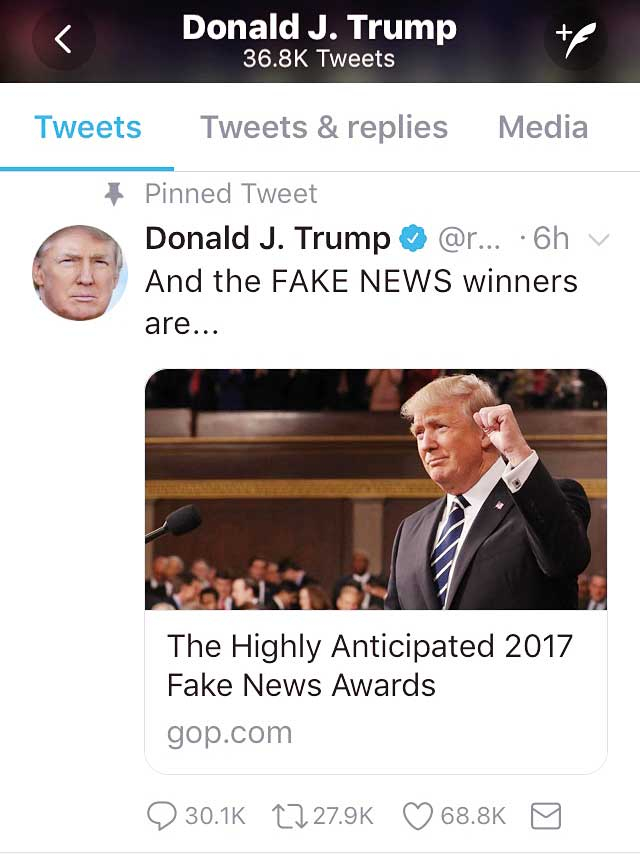Washington: US President Donald Trump — who gleefully questioned Barack Obama’s birthplace for years without evidence, long insisted on the guilt of the Central Park Five despite exonerating proof and claimed that millions of illegal ballots cost him the popular vote in 2016 — wanted to have a word with the American public about accuracy in reporting.
On Wednesday, after weeks of shifting deadlines, and cryptic clues, Trump released his long-promised “Fake News Awards”, an anti-media project that had alarmed advocates of press freedom and heartened his political base.
“And the FAKE NEWS winners are …,” he wrote on Twitter at 8 p.m. Eastern time.
The message linked, at first, to a malfunctioning page on GOP.com, the Republican National Committee website. An error screen read: “The site is temporarily offline, we are working to bring it back up. Please try back later.”
When the page came back online less than an hour later, it resembled a Republican Party news release. Headlined “The Highly Anticipated 2017 Fake News Awards” and attributed to “Team GOP”, it included a list of Trump administration accomplishments and jabs at news organisations presented in the form of an 11-point list.
The “winners” were CNN, mentioned four times; The New York Times, with two mentions; and ABC, The Washington Post, Time and Newsweek, with one mention apiece.
Taken as a whole, Trump’s examples of grievances came as no surprise to anyone who has read his complaints about the media on Twitter.
The various reports singled out by Trump touched on serious issues, such as the media’s handling of the investigation by the special counsel Robert Mueller into the Trump campaign’s possible ties to Russia, and frivolous matters, like the manner in which journalists conveyed how the president fed fish during a stop at a koi pond on his visit to Japan.
From the beginning, the awards were the sort of Trump production that seemed easy to mock but difficult to ignore. Members of the news media joked about the speeches they would prepare, the tuxedos and gowns they would fetch. It would be an honour, they said, just to be nominated.
Here, it seemed, was the opera bouffe climax of Trump’s campaign against the media, a bizarro-world spectacle that both encapsulated and parodied the president’s animus toward a major democratic institution.
Late-night comedy shows created satirical Emmys-style advertising campaigns to snag what some referred to as a coveted “Fakey”.
“The Late Show With Stephen Colbert” bought a billboard in Times Square, nominating itself in categories like “Least Breitbarty” and “Corruptest Fakeness.” Jimmy Kimmel, who has emerged as a Trump bete noire, called it “the Stupid People’s Choice Awards”.
Politico reported that the awards could even pose an ethical issue for White House aides, with some experts arguing that the event would breach a ban on government officials using their office to explicitly promote or deride private organisations.
And press advocates cringed at the prospect of a gala dedicated to the phrase “fake news”, which has already helped corrode trust in journalism in the US and around the world. In response to Trump’s endeavour, the Committee to Protect Journalists this month recognised the president among the “world leaders who have gone out of their way to attack the press and undermine the norms that support freedom of the media”.
Two Republicans from Arizona, Senator John McCain and Senator Jeff Flake, denounced Trump’s anti-press attacks, with Flake noting in a speech on the Senate floor on Wednesday that the president had borrowed a term from Stalin to describe the media: “enemy of the people”.
The buzz around the president’s latest anti-press stunt has contributed to a larger shift in American attitudes toward the press. In a study released this week by Gallup and the Knight Foundation, 66 per cent of Americans who were surveyed said most news organisations blurred opinion and fact, up from 42 per cent in 1984. “Fake news” was deemed a threat to democracy by a majority of respondents.
Trump’s list did not mention BuzzFeed, a media outlet that drew his ire last year when it published a salacious and largely unsubstantiated intelligence dossier that purported to lay out how Russia had aided the Trump campaign.













